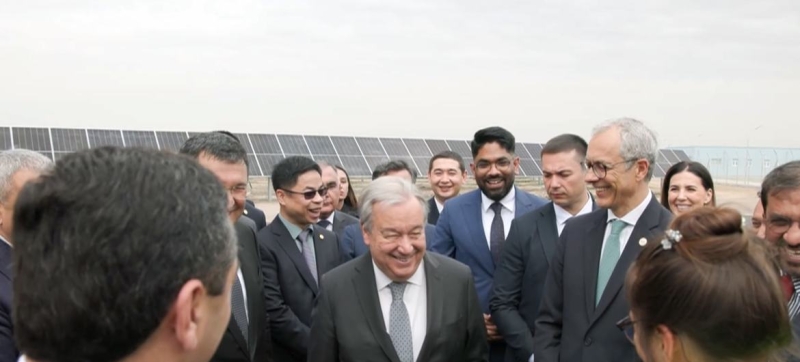
UN Secretary General Antonio Guterres visits the RiverSide solar photovoltaic plant in the Tashkent region. Uzbekistan is actively reforming its energy sector Economic development
In 2021, Uzbekistan made a voluntary commitment to reduce greenhouse gas emissions per unit of GDP by 35 percent by 2030 compared to 2010 levels. This is a significant increase from the original commitment, reflecting Uzbekistan’s commitment to greater climate action.
During his official visit to Uzbekistan this week, UN Secretary-General Antonio Guterres visited the RiverSide solar photovoltaic plant located in the Tashkent region. He got acquainted with changes in the field of “green” energy in Uzbekistan, the results achieved and plans for the future.
Energy sector reform
Uzbekistan’s energy sector reform goals include generating 40 percent of its electricity from renewable sources by 2030. Achieving this goal would offset 16 million tonnes of CO2 emissions per year.
Riverside Photovoltaic Station
The Riverside Photovoltaic Station is a key component of this commitment. The station is part of a broader initiative that includes multiple renewable energy projects in Uzbekistan.
The station’s ability to generate clean energy will significantly reduce dependence on fossil fuels, resulting in a reduction in greenhouse gas emissions. In addition, the integration of a 500MWh battery energy storage system ensures the stability and efficiency of renewable energy supply, making it a more viable alternative to traditional energy sources.
During a visit to the Riverside solar PV plant, the UN chief praised Uzbekistan’s commitment to using renewable energy and reducing its dependence on fossil fuels.
Cooperation with Saudi Arabia
ACWA Power, a leading Saudi developer, investor and operator of power generation, desalination and green hydrogen plants worldwide, signed three power purchase agreements and investment agreements with the Joint Stock Company (JSC) National Electric Grids of Uzbekistan and the Ministry of Investment, Industry and Trade of Uzbekistan.
The agreements include the development of three solar PV projects in Tashkent and Samarkand and three battery energy storage systems in Tashkent, Bukhara and Samarkand.
Battery Energy Storage
With the inclusion of battery energy storage systems in the power grid, Uzbekistan will soon have the largest battery energy storage facilities in the region, which will play a decisive role in stabilizing the power grid and developing renewable energy in the country . They will help mitigate the intermittency effects inherent in renewable energy sources.
Battery systems will store excess electricity generated during periods of high output and provide it during periods of low output. This will ensure a constant and reliable supply of electricity to the grid, which will ultimately help meet the growing energy demand in Uzbekistan.
Socio-economic benefits
These projects have huge socio-economic benefits for Uzbekistan, as they will provide electricity to more than a million households in Tashkent, Samarkand and Bukhara and offset about 1.6 million tons of carbon dioxide emissions per year.
Public-Private Partnerships
Public-private partnerships are playing a critical role in transforming Uzbekistan’s energy sector. The RiverSide PV plant is a prime example of how PPPs can facilitate large-scale renewable energy projects.
